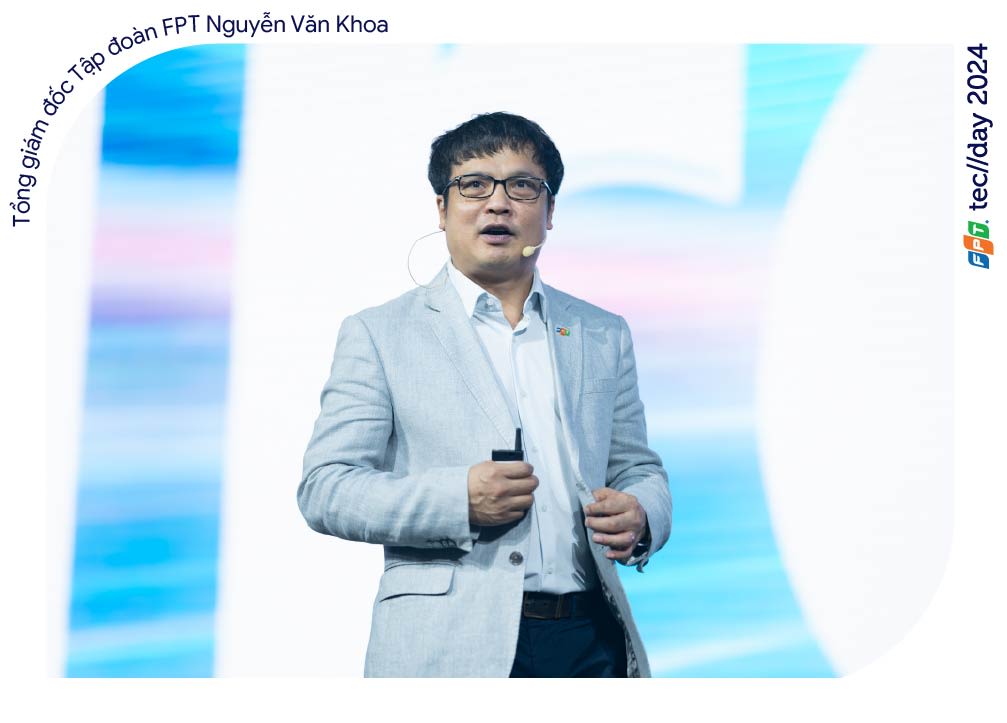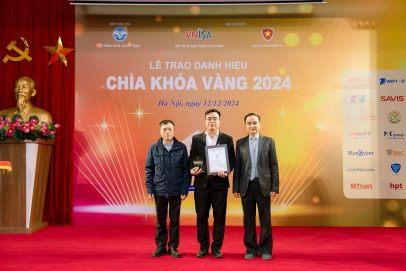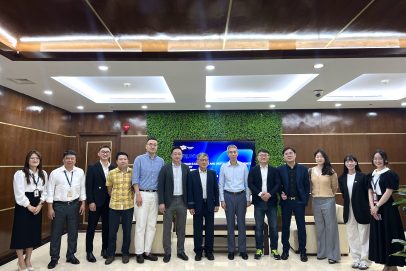Harnessing the Power of Data in the Digital Age: From Strategy to Action
The world is facing three major transformations: technological transformation, green transformation, and AI transformation. In the global competition, with the rise of Vietnam’s human resources in technology, the country is set to become a cradle for technological talent for the world. Notably, in the digital transformation revolution, data will be converted into money, and Vietnam must seize this opportunity to establish our position, affirmed Chairman of FPT Corporation Mr. Truong Gia Binh at the recently held FPT Techday event.
General Secretary Mr. To Lam using the term “digital transformation revolution” is an extremely fitting choice for Vietnam because the “digital transformation revolution” focuses on the power of people. Vietnamese people are second to none in creativity and the spirit of learning. Harnessing that power will be a strategic move, positioning Vietnam as a cradle of technological talent for the world. Data will be converted into money,” shared Mr. Truong Gia Binh, Chairman of FPT Corporation, at the FPT Techday event.
This topic was also actively discussed by experts during the seminar “Harnessing the Power of Data in the Digital Age: From Strategy to Action,” held as part of the event. The session was moderated by Mr. Nguyen Hoang Minh, CEO of FPT IS, FPT Corporation, with the participation of Lieutenant Colonel Mr. Nguyen Anh Tuan, Deputy Director of the National Population Data Center under the Ministry of Public Security; Mr. Nguyen Viet Ha, Director of the Department of IT and Financial Statistics under the Ministry of Finance; and Mr. Nguyen Viet Hung, Director of the Hanoi Department of Information and Communications.
The content of the seminar was strongly inspired and guided by the directives and policies of the Communist Party of Vietnam and the Government, as well as recent laws, decrees, and policies on data, such as the Data Law and the Data Protection Law. These topics attracted nearly 1,000 attendees during Techday 2024 on November 14.
Data is the nation’s invaluable resource and the “fuel” for the digital transformation revolution.
“We couldn’t sleep the whole night after hearing the General Secretary’s speech for the first time, declaring digital transformation as a key driver to propel the country into a new era. This is truly an opportunity for technology enterprises like FPT. So, what will FPT do to help the country rise in this new era?” shared FPT CEO Mr. Nguyen Van Khoa during the seminar on the afternoon of November 14, part of the FPT International Technology Forum 2024. According to Mr. Khoa, FPT identifies the future era as one driven by data and focuses on how to harness it effectively. He compared data to crude oil buried deep underground, requiring multiple stages of extraction and refinement to become a usable product. Data is the new resource, but transforming this resource into money is by no means an easy task.
“Currently, Vietnam is facing a significant challenge: can data be transformed into a resource and a producible raw material?” posed Mr. Nguyen Hoang Minh, CEO of FPT IS, FPT Corporation, during the seminar.
The Foundation for Generating High-Quality Data
According to Lieutenant Colonel Mr. Nguyen Anh Tuan, Deputy Director of the National Population Data Center under the Ministry of Public Security, Government Resolution 175/NQ-CP on approving the National Data Center Project stems from Proposal 06: “Developing the application of population data, identity verification, and electronic authentication to support national digital transformation for the 2022–2025 period, with a vision toward 2030.”
During its implementation, Proposal 06 encompasses five key tasks: reforming administrative procedures, developing digital citizenship, applying data to socioeconomic development, enriching population data, and utilizing data for policy-making. However, all five areas have encountered challenges during execution, leading to the introduction of Resolution 175 to address one of these issues.
Resolution 175 was introduced with the goal of establishing a standardized national integrated database to serve the needs of the Government, society, businesses, and citizens. Additionally, the resolution aims to address issues related to data exchange and distribution, as during the implementation of Proposal 06, a significant amount of data existed across various ministries, sectors, and localities but lacked proper integration.
During the implementation process, ensuring adequate resources and technological capacity for ministries and sectors to tackle information technology and data-related challenges has also been a major concern. Resolution 175 will provide support to ministries, sectors, and especially localities that lack the necessary technological infrastructure.
”When we ensure these conditions, we can build a sufficient large-scale database to apply advanced technological solutions such as AI, blockchain, and big data. At the same time, we can more thoroughly address administrative procedures and create a foundation for researching and developing data applications to solve operational challenges for ministries, sectors, and localities, as well as tools to serve businesses and citizens. These are the key objectives of Resolution 175 in establishing the National Data Center,” shared Mr. Tuan
According to Mr. Nguyen Viet Hung, Director of the Hanoi Department of Information and Communications, there are currently four key types of data we need to manage for social governance: IDENTITY – related to the population; LAND – related to land use; MONEY – related to finances; and ORGANIZATION – related to structuring the system for more effective and efficient state management. In this new era of governance, we need to look at data, as data will tell us how to make the most informed decisions.
Every second, the data generated by human technology systems surpasses the total amount of data throughout human history, making the task of harnessing this vast amount of data no easy feat. “At the same time, how data is shared, and how stakeholders exploit it transparently and openly, must wait for the Data Law to come into effect. We need to develop a scientific data law, ensuring that all parties can participate in enriching and exploiting this data in a structured and scientific manner,” Mr. Hung emphasized.
A small step but a big change with data.
The discussions at the seminar revealed promising signals about the progress and specific action plans of leading units in shaping strategies and harnessing important data sources to create value and new services that effectively support governance and public services for businesses and citizens. If data is a resource, then the data from the Ministry of Finance can be considered gold.
For example, the Ministry of Finance – the unit managing vital data from taxes, customs, insurance, and more – has a significant impact on various aspects of operations across multiple sectors. The ministry has outlined and taken decisive actions. Mr. Nguyen Viet Ha, Director of the Department of Informatics and Financial Statistics, Ministry of Finance, shared that to create input data sources for organizing data in the finance sector, by 2019, the Department of Informatics and Financial Statistics had completed the approval of the National Financial Database Architecture.
The Ministry of Finance is continuously developing and maintaining nearly 100 software applications to serve as input data sources for the database, from which data can then be shared and used for Project 175.
“This information system, in addition to managing internal operations within the finance sector, also aims to share and provide information to government departments, as well as to citizens and businesses. We believe that through Project 175 and the National Data Strategy, we will have a platform for sharing and a consistent system of indicators, enabling us to proactively organize and exchange data with external agencies,” said Mr. Ha.
Leading the seminar, Mr. Minh gave an example: In Hanoi, the VNeID app processes 800 pieces of judicial data per day. Previously, to obtain a criminal record verification, citizens had to visit local government agencies depending on their jurisdiction, wait for several days, and pay a fee. However, now, we can completely access this service through VNeID. This is a small technological success but a significant change contributing to society.
Sharing about the digital transformation achievements of the capital, Mr. Nguyen Viet Hung, Director of the Hanoi Department of Information and Communications, stated that Hanoi recently received two awards for smart city initiatives: smart infrastructure and smart online public services. This is a result that proves the efforts of the Department of Information and Communications and the city’s departments under the leadership of the city’s leaders over the past two years.
Hanoi is also moving towards the inauguration of the city’s main data center, which will be based on a modern cloud computing model through service leasing. This center has been highly praised by the Steering Committee of Project 06 and the Prime Minister for Hanoi’s approach to service leasing.
In the near future, Hanoi will officially issue the capital’s data strategy. Specific plans will be made to develop all three pillars: Digital Government, Digital Society, and Digital Citizens.
Regarding the digital society, the city will develop layers of data analysis focused on specific sectors, industry economics, and the field. Particularly, the field data will include citizens’ inputs, data from surveillance cameras, environmental monitoring, flood data, etc., and finally, spatial data. “Digital transformation and data utilization will be the best approach to realizing this goal,” Mr. Hung emphasized.
Mr. Hùng believes that in the new era of governance, data will help us make the right decisions to solve specific problems at the right time. Accordingly, Hanoi has been, is, and will continue to actively cooperate with the Ministry of Public Security and other relevant departments to effectively implement data usage.
Prime Minister Mr. Pham Minh Chinh also affirmed: Digital data is a national asset, and the more it is utilized, the more the country will develop. The Prime Minister has requested that ministries and agencies implement a series of specific solutions to bring practical benefits to citizens and businesses. To fulfill the request for “transparent policies, seamless infrastructure, and intelligent management,” the Prime Minister has asked for a focus on promoting the creation of data through connecting, sharing, and exploiting national databases; enhancing investment in the development, upgrading, and modernization of digital infrastructure; and increasing communication on digital transformation.
The opportunity for businesses to embrace the wave of data transformation
During the seminar, the leaders unanimously agreed that the fundamental issue for supporting the data exploitation process is the need for economics and technology.
The seminar at FPT Techday.
Sharing about the involvement of technology enterprises and how businesses can contribute to building the national database, Colonel Mr. Nguyen Anh Tuan stated that, in terms of technology, large corporations like FPT are still partnering with the Ministry of Public Security in designing and implementing appropriate solutions to successfully deploy the national data system.
“More importantly, the focus is on the future direction. Once we have the national data system, what benefits will it bring to businesses and citizens? And conversely, how can businesses contribute to the national data system? Data is a valuable and indispensable resource in the digital development process. When the national database is established, it will make it more convenient for citizens and businesses to carry out procedures. Furthermore, the contribution of businesses and citizens to the development of the overall system is crucial, because only when we have a large enough data source can we apply solutions and plan the right, appropriate strategies.”
Mr. Nguyen Viet Ha, Director of the Department of Information Technology and Financial Statistics at the Ministry of Finance, believes that the most fundamental issue in supporting the data utilization process is having the financial resources. Digital transformation requires adequate funding. Therefore, businesses also need to invest and allocate appropriate resources to partner with technological strength.
Alongside the data challenge, CEO of FPT Corporation Mr. Nguyen Van Khoa, stated that during its 25 years of internationalization, FPT has accumulated valuable knowledge in designing, enriching, and utilizing data transparently. FPT’s strategic direction in the country’s new era will focus on three pillars: high-quality human resources, data protection and sovereignty of Vietnam in the digital space, and turning data into money.
Regarding high-quality human resources, Mr. Khoa mentioned that FPT currently has over 80,000 staff and aims to reach 1 million employees by 2035. He also shared that STEM, AI, and robotics have already been incorporated into the curriculum at both the secondary and university education levels, and these are invaluable sources of talent for the new era.
As for data, Mr. Khoa emphasized that, in the new era, data is akin to oil, which is the lifeblood of the economy.
FPT is working with the government and local departments to promote the implementation of Project 06 on “Developing applications for citizen data, digital identification, and authentication to serve national digital transformation in the 2022-2025 period, with a vision until 2030.” “We have selected some models to implement the project, aiming to achieve certain results by 2025, creating favorable conditions for civil servants to work and serve the public in the best possible way,” Mr. Khoa underscored.
FPT is also closely partnering with localities and ministries such as Hanoi, Ho Chi Minh City, the Ministry of Finance, and the General Department of Taxation, etc. With businesses, FPT is working alongside them to enhance their digital management capabilities, enabling them to become data-driven enterprises operating in real time. FPT will help these businesses integrate AI into all of their operations to create new value and competitive advantages.
Along with the three pillars mentioned, FPT is also striving to establish a new digital infrastructure, improving its data processing and analysis capabilities, and accompanying the country into the new era.
According to Mr. Truong Gia Binh, organizations and businesses are facing many challenges and limitations they must comply with, and AI is the key to modernization. Mr. Truong Gia Binh highlighted: “The time for Vietnam has come, with a young and talented workforce, which is the resource for this new phase. Over the past period, FPT has been and will continue to do everything to integrate AI, STEM, and Robotics into the education system. Most importantly, people must master technology and AI to avoid having skilled AI professionals take jobs away in the digital age.”





















